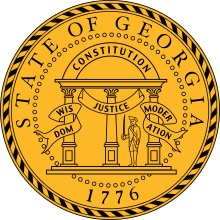John Martin (Governor of Georgia)
John Martin (c.1731 – January 1786) was an American planter, soldier, and politician.
Little is known of Martin's early life. He was born in Providence, Rhode Island and moved to Georgia in 1767 with his brother James, where they bought adjoining plantations.
Martin was active during the American Revolution, serving as a delegate to the provincial congress in July 1775, as well as a member of the local Committee of Safety. In the War of Independence he was appointed lieutenant of the 7th company of the Georgia Regiment in the Continental Army in January 1776, and rose to the rank of lieutenant colonel in 1777.
His political service includes mayor of Savannah, Georgia (1778), sheriff of Chatham County, Georgia, member of the Georgia House of Representatives, state Treasurer, and revolutionary governor of Georgia from 1782 to 1783.
While governor, Martin offered full pardons to all Loyalists who surrendered to general Anthony Wayne, as well as offering land to Hessians who left the British. These actions increased desertions from the British forces. With Georgia in a state of financial ruin at the end of the war, he also passed a Confiscation and Banishment Act in 1782 which seized the property 342 Loyalists identified by name. After the war, Martin served as a commissioner in meetings with Creek and Cherokee Indians.
References
- Cook, James F. The Governors of Georgia. Mercer University Press, 2005. ISBN 0-86554-954-0.
- Georgia State Archives Roster of State Governors
- Georgia Governor's Gravesites Field Guide (1776-2003)
| ||||||||||||||||
| Political offices | ||
|---|---|---|
| Preceded by Nathan Brownson |
Governor of Georgia 1782 - 1783 |
Succeeded by Lyman Hall |
